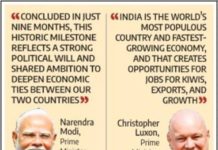http://www.freepressjournal.in/business/india-and-sweden-trying-to-take-their-sambandh-to-next-level/1117582
India-Sweden ties to grow stronger

Shortly after India’s independence in 1947, Sweden recognised India as an independent country, following which both Sweden and India established formal diplomatic relations in 1949.
About 10,000 Indian citizens reside and work in Sweden, along with an additional 9,000 people of Indian origin. Both these groups are mainly employed in business or professional fields.In June 2016, Pranab Mukherjee became the first President of India to make a state visit to Sweden, further boosting relation of both countries. The bilateral trade stands at over USD 2 billion. After China and Japan, India is Sweden’s third largest trade partner in Asia. The main Swedish exports to India are pharmaceuticals, paper and pulp products, chemicals, engineering products and telecom equipment. India’s primary exports to Sweden are chemical products, food products, and semi-manufactured and manufactured goods.
Rahul Nayar and R N Bhaskar of the Free Press Journal met the Swedish Consul General in Mumbai, Ulrika Sundberg and spoke to her on the dynamic relationship.
Q. How old is the commercial relationship between India and Sweden?
A. Swedish businesses have been in India for more than 110 years.
Q. Where does India and Sweden stand in terms of trade?
A. India is Sweden’s 19th largest export market and third largest trade partner after China and Japan in Asia. In fact, Indian exports to Sweden has picked-up more than vice versa.

Change per cent from 2014-2015 = 5.4 %
Change per cent from 2015-2016 = -18 %
There was a 5.4 per cent increase in Swedish export to India in the year 2015. Due to Swedish companies manufacturing goods in India and supporting the Indian government’s ‘Make in India’ initiative, 2016 saw a slight slowdown from the previous year. But having said that sectors like food and beverage, and crude materials saw an increase.

Change per cent from 2014-2015 = 12 %
Change per cent from 2015-2016 = 0.7 %
Many Indian IT companies have opened offices in Sweden. Indian Pharma and Biotech companies are also present. Aditya Birla Group, Wipro, Tata and Bharat Forge are among the other major Indian investors in Sweden.
Many Swedish companies such as Ericsson, Swedish Match (WIMCO), SKF and ASEA (later to become ABB) came to India before independence. Since then numerous other Swedish companies like Atlas Copco, Sandvik, Alfa Laval, Astra Zeneca, SAAB, etc., have invested in India. Other leading Swedish MNCs such as transport solution providers like Scania and Volvo; the medical instruments manufacturer like Getinge; and retail giants like IKEA and H&M are among the most recent entrants.
Q. What is the total size of Swedish investments in India?
A. At present, there are over 185 Swedish companies in India. According to Swedish statistics, the size of investment is about USD 140 million (foreign direct investments from Sweden to India). According to DIPP, the cumulative Indian investment in Sweden is in the range of USD 700-800 million. USD 1,016 million is Sweden’s export of goods to India.
USD 678 million is India’s export of goods to Sweden.
Q. How many people are employed by Swedish businesses in India? Are there any Swedish SMEs in India?
A. Swedish businesses employ 1,85,000 people directly in India and another 13,00,000 indirectly across the country. Yes, there are 33 Swedish SMEs in India.
Q. Which Swedish environment solutions/waste management projects are in India?
A. Swedish solutions in environmental technology such as waste management systems, is arousing interest of many countries. Besides the practical issues such as waste collection and treatment, it is a matter of looking at waste as a resource. Waste can be used for energy production, materials for recycling, and to extract fertilizer. There is also a widespread interest in the ‘Swedish model’ – that is the distribution of responsibilities and the interactions between legislation, technology and social and governance practices.
Today, India is the third largest emitter of carbon dioxide and emissions are expected to double by 2030. The ongoing urbanisation gives rise to increasing amounts of municipal waste. Scania is working towards developing the production of biogas as an automotive fuel in the Indian city of Nagpur. The biogas will be produced from digested sludge from one of the city’s wastewater treatment plants in collaboration with local companies. Nagpur is participating in the Indian Government’s initiative of smart cities to improve the environment and transport systems in the country’s 100 largest cities. Sweden has vehicles and technologies that can contribute to this shift. We see great opportunities for Sweden as a country to lead the development towards sustainable cities in the world in general and in India in particular.
Another example of a Swedish company that is tackling the problem of waste management is Envac, the global pioneer of underground automated waste collection. The company has installed the world’s first integrated automated waste and recyclable segregation plant in the Gujarat International Finance and Tech-City (GIFT City) – a landmark site covering 886 acres in Gandhinagar. Envac’s automated waste collection system and recyclable segregation plant has been in operation since April 1, 2015. By 2025 – 2028, Envac will handle the waste of the entire district which is expected to be over 400 tonnes per day.
Q. Which Swedish companies are implementing gender equality in India?
A. Sweden believes that women and men should have equal opportunities and rights as well as power to shape society and their own lives. Sweden has come a long way with its gender equality model. The Swedish government has declared itself as a feminist government which is devoted to implementing gender equality policy domestically and a feminist foreign policy. Globally, Swedish company—Ikea strives to reach 50 percent women recruitment mark before they open a new store. Ericsson plans to increase women in its workforce by 2020. The company wants to have 30 per cent women in its workforce in the next four years, up from 22 per cent at present. The company in collaboration with Plan India has also launched its community-based ‘Digital Learning Centres’ program for young women living in urban slum clusters. Based on Ericsson’s global education initiative ‘Connect to Learn’, the centres aim to provide access to quality education for young women in India.
Sandvik is another company whose commitment to gender equality is derived from its Swedishness. Sandvik doesn’t just celebrate gender equality and diversity but also assumes the responsibility of recognising individuals who demonstrate exemplary leadership in promoting gender equality, diversity and inclusion. In 2016, the company launched the Sandvik India Diversity Awards and attracted entries across health, employment, entrepreneurship, sanitation, education, sports, social change, arts and culture interventions.

Q. Where do Sweden companies stand in terms of end-to-end activity (from education to jobs for women) in India?
A. Eight out of 10 companies work actively with gender equality. Around seven out of 10 companies work with skills development through their business operations or community engagement. The Consulate General of Sweden is about to launch a pilot project titled ‘Kraftsamla’ together with the Swedish Chamber of Commerce India and Swedish companies based in Pune to increase the ratio of women in the labour force and create a pool of skilled women from the underprivileged background.
Our mission is to bring the Swedish collective to join hands in changing women’s lives in India. The first step is to improve the opportunities for employment, apprenticeship and enterprising through education and building skills of women. Our statement of belief is that women’s empowerment and economic participation ignites catalytic processes to change eco-systems on micro and macro level and have generational impact. Women are key for the next economical boost of India which can lead to a 60 per cent increase in GDP.










































COMMENTS